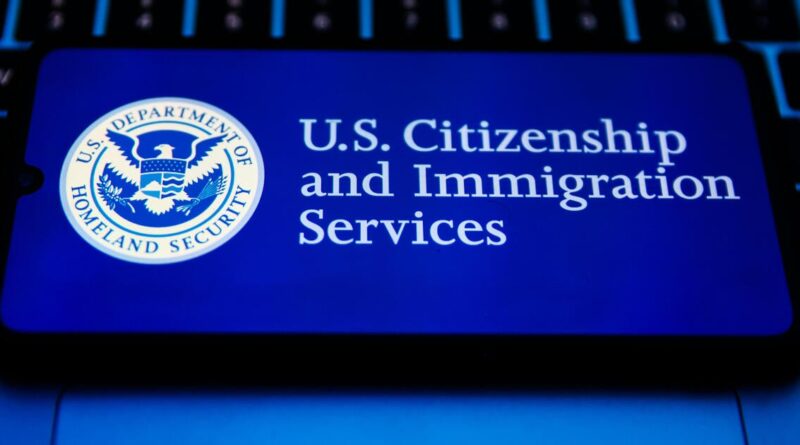U.S. pauses immigration applications for certain migrants welcomed under Biden
The Trump administration has enacted a pause on all immigration applications filed by migrants from Latin America and Ukraine allowed into the U.S. under certain Biden-era programs, citing fraud and security concerns, according to two U.S. officials and an internal memo obtained by CBS News.
The application freeze will remain in place indefinitely while government officials work to identify potential cases of fraud and enhance vetting procedures to mitigate concerns related to national security and public safety, according to the directive.
The move, which had not been previously reported, threatens to cast a cloud of uncertainty over many migrants who were in the process of applying for various immigration benefits that would allow them to stay in the U.S. legally and, in some cases, permanently.
While the exact number of affected migrants is unclear, the hold on applications applies to several Biden administration programs that allowed hundreds of thousands of foreigners to come to the U.S. legally through an immigration law known as parole. That law empowers the U.S. government to welcome foreigners quickly on humanitarian or public benefit grounds.
The Biden administration used parole at an unprecedented scale, partially to encourage migrants to sign up for legal migration channels instead of crossing the southern border unlawfully. The Trump administration moved swiftly to suspend those efforts, arguing that they abused the parole authority.
The Trump administration had previously halted new entries under Biden-era parole policies. But in a memo dated Feb. 14, Andrew Davidson, a top U.S. Citizenship and Immigration Services official, ordered an agency-wide “administrative pause” on all “pending benefits requests” filed by migrants already allowed into the U.S. under three Biden administration programs.
They include a policy, called Uniting for Ukraine, set up to offer a safe haven to those fleeing the Russian invasion of Ukraine. Roughly 240,000 Ukrainians with American sponsors arrived in the U.S. under that process before President Trump took office. Another affected program, known as CHNV, allowed 530,000 Cubans, Haitians, Nicaraguans and Venezuelans sponsored by American citizens to enter the U.S.
The third impacted program consists of processes that permitted some Colombians, Ecuadorians, Central Americans, Haitians and Cubans with American relatives to come to the U.S. to wait for a family-based green card to become available.
Because those allowed into the U.S. under these programs were only given temporary work permits and deportation protections that typically last for two years, many of them applied for other immigration benefits, lawyers and experts said.
Those benefits include a program known as Temporary Protected Status for migrants from crisis-stricken countries like Haiti, Ukraine and Venezuela; asylum, which allows those fleeing persecution to gain a permanent safe haven in the U.S.; and green cards, or permanent American residency. Because of a Cold War-era law, Cubans paroled into the U.S. are eligible to apply for green cards.
But under the internal USCIS directive, officials will no longer be able to process any applications for these programs or any other benefit if the requests were filed by migrants who arrived in the U.S. under the targeted Biden administration policies.
“This effectively freezes their ability to move into another legal status,” said Lynden Melded, who served as the top lawyer at USCIS during the administration of former President George W. Bush and now works as a partner at Berry Appleman & Leiden LLP. “In the interim, they would remain susceptible to removal from the country if the government terminates their parole status.”
The USCIS memo said the move is justified because “[c]urrently, fraud information and public safety or national security concerns are not being properly flagged in USCIS’ adjudicative systems.” The directive cites the Biden administration’s move last year to temporarily pause the parole initiative for Cubans, Haitians, Nicaraguans and Venezuelans due to fraud concerns.
In his memo, Davidson referenced investigations that he said found thousands of CHNV applications with “serial sponsors,” information of deceased individuals or identical addresses. He said some of those cases were proven to be fraud. Davidson also said some migrants allowed into the U.S. under CHNV “were not fully vetted.”
The pause, Davidson said in his memo, could potentially be lifted, but only once officials complete a “comprehensive review and evaluation of the in-country population of aliens who are or were paroled into the United States under these categorical parole programs.”
Representatives for DHS did not respond to requests to comment on CBS News’ reporting.
The Trump administration has targeted those who’ve come to the U.S. under the Biden-era immigration parole programs in other ways, too.
Last month, officials authorized federal immigration agents to seek the deportation — including in an expedited fashion in some cases — of those permitted to enter the U.S. under the CHNV program and other Biden administration parole policies. The administration has also drafted plans to revoke the parole status of many of those who’ve come to the U.S. under CHNV.


